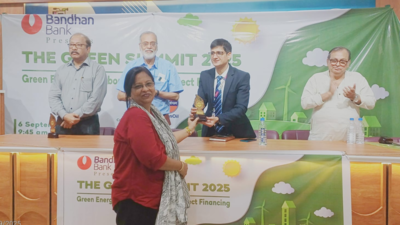ARTICLE AD BOX

Kolkata workshop addressed the climate emergency, emphasizing the need for collective action and awareness to mitigate the impending crisis
KOLKATA: With the climate emergency looming large, environmental activists, scientists, researchers, and influencers gathered at the Press Club of Kolkata for a day-long workshop to discuss urgent challenges facing humanity.
The event came against the backdrop of this year’s COP in Brazil, which called for collective global action to avert what experts warn could be the “decimation of mankind” if unchecked warming continues.“We are at a crucial juncture from which we may move to a point of no return,” cautioned Sandip Chakraborty, key organiser of the workshop and editor of the newly launched Climate24.in. “We must build collective awareness to reduce heat-trapping CO₂ before the planet becomes irreversibly hot, leading to unprecedented sea-level rise that will inundate global cities — particularly vulnerable coastal hubs like Kolkata.
”Adding to the sense of urgency, Prabir Purkayastha, founder of the Delhi Science Forum and chief editor of NewsClick, stressed lifestyle transformation: “We need heightened awareness among ordinary people and a holistic shift towards climate-friendly practices. The faster we do this, the better it will be for humanity and our habitat.”
The conversation also turned to the environmental cost of development. Dr Kalyan Rudra, chairperson of the West Bengal Pollution Control Board, drew parallels with Uttarakhand: “We have already seen the consequences of rampant tree-felling for tunnel, road, and bridge construction there.
Unfortunately, we are repeating the same mistakes here in Kolkata with indiscriminate cutting of trees.”From a health perspective, Dr Fuad Halim highlighted the dual risks posed by climate change. “Firstly, it will reduce access to nutritious food, and secondly, rising heat will trigger numerous illnesses, including heat-related diseases that threaten vulnerable populations.”The workshop concluded with a panel discussion on how climate stories should be communicated so the urgency resonates with ordinary citizens.
Senior journalists including Snehsish Sur, Jayanta Basu, Amal Sarkar, Himadri Sarkar, Debdut Ghoshthakur, and Rotabrata Bhattacharya emphasised that framing narratives in simple, relatable terms is critical to bridge the gap between science and society.The consensus at the workshop was clear: Kolkata, like many coastal cities, stands on the frontline of the crisis. Only collective awareness, decisive action, and effective storytelling can hope to slow the march towards a climate catastrophe.



.png)
.png)
.png)
















 4 days ago
5
4 days ago
5








 English (US) ·
English (US) ·